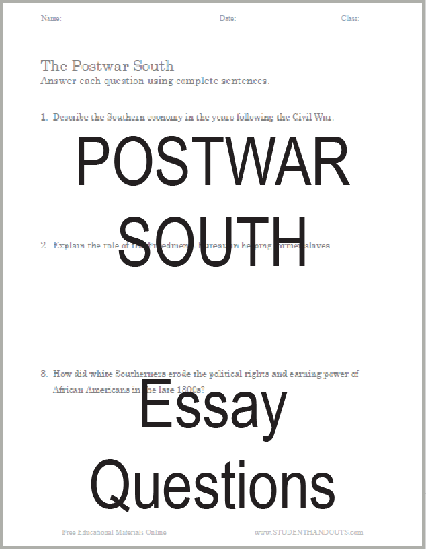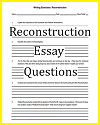| Postwar South Essay Questions |
|---|
| www.studenthandouts.com ↣ U.S. History ↣ U.S. Civil War ↣ U.S. Civil War Worksheets |
 |
    |
|
Click here to print. Answers will vary. 1. Describe the Southern economy in the years following the Civil War. 2. Explain the role of the Freedmen's Bureau in helping former slaves. 3. How did white Southerners erode the political rights and earning power of African Americans in the late 1800s? The Freedmen's Bureau, officially known as the Bureau of Refugees, Freedmen, and Abandoned Lands, was a federal agency established by Congress on March 3, 1865, during the Reconstruction era following the American Civil War. Its primary mission was to provide assistance and support to formerly enslaved African Americans and white refugees who were displaced or left destitute by the war. The Freedmen's Bureau played a crucial role in helping former slaves in several ways. Education: One of the most significant achievements of the Freedmen's Bureau was its efforts to establish schools for African Americans throughout the South. These schools, often referred to as "Freedmen's Schools," provided basic education to both children and adults who had been denied access to learning under slavery. Labor Contracts: The bureau helped former slaves negotiate fair labor contracts with landowners, ensuring that they were not subjected to exploitative working conditions or unpaid labor. These contracts aimed to provide newly freed individuals with some economic independence. Land Redistribution: While the promise of "40 acres and a mule" did not fully materialize, the Freedmen's Bureau was involved in some land redistribution efforts. It sought to provide land to formerly enslaved individuals, enabling them to become landowners and farmers. Legal Assistance: The bureau provided legal assistance to African Americans facing legal challenges, including disputes over labor contracts, property rights, and civil rights violations. It helped protect their legal rights and access to the justice system. Food and Shelter: The Freedmen's Bureau distributed food, clothing, and shelter to destitute African Americans and white refugees, particularly during the immediate post-war period when many people faced severe hardships. Family Reunification: The bureau assisted in reuniting families that had been separated during slavery due to forced migration and sales. Efforts were made to help locate family members and facilitate their reunification. Civil Rights Protection: The Freedmen's Bureau played a role in protecting the civil rights of African Americans. It investigated and reported on instances of racial violence, discrimination, and harassment, which helped raise awareness of the challenges African Americans faced. Marriage Records: The bureau recorded marriages of formerly enslaved individuals, which had often gone unrecognized under slavery. These records helped establish legal marriages and family ties. Healthcare: While limited in scope, the Freedmen's Bureau also provided some healthcare services, including basic medical care and assistance in dealing with some health-related issues. Transition to Freedom: As a transitional agency, the Freedmen's Bureau aimed to help former slaves make the transition from slavery to freedom. It provided guidance on personal and economic matters, offering advice on how to navigate the challenges of a changing society. While the Freedmen's Bureau made significant efforts to assist formerly enslaved individuals, its effectiveness varied by location, and it faced significant challenges, including resistance from white Southerners who opposed the agency's work. Despite its limitations and challenges, the Freedmen's Bureau played a critical role in the early years of Reconstruction in helping African Americans secure basic rights and begin the process of social and economic integration into American society. |
| www.studenthandouts.com ↣ U.S. History ↣ U.S. Civil War ↣ U.S. Civil War Worksheets |








